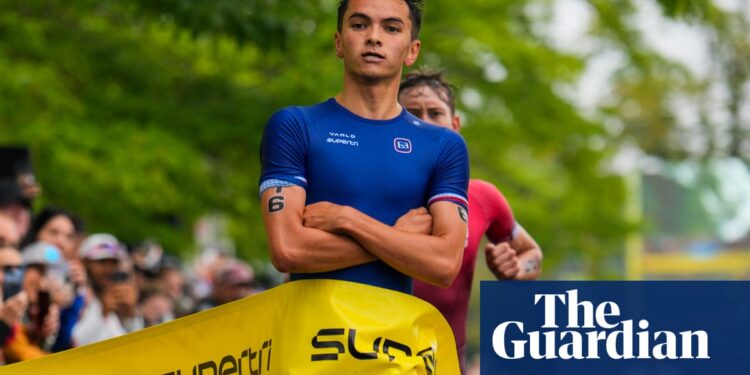Alex Yee does not immediately strike you as a showman. There is little brash about the slight, unassuming south Londoner who became the most decorated triathlete in Olympic history just a few weeks ago and when he talks about athletes in ancient times it is not easy to picture him slugging it out in the Colosseum. He is, however, developing a keen sense of theatre.
His individual Olympic gold medal in Paris ranks as one of the most dramatic moments of the Games. He was seemingly out of contention with 1km of the 10km run remaining, scrapping to hold on to silver and 14sec down on Hayden Wilde of New Zealand, but a miraculous surge past his great rival with 400m to go took him to the top of the podium. A few weeks later at an event in Boston he pulled off a similarly dramatic finish, again edging past Wilde near the finish line.
Yee was plastered across front and back pages for his Olympic feats – he added relay bronze in Paris to go with an individual silver and team gold from Tokyo 2020 – but he made further headlines with his victory in Boston, folding his arms as he crossed the line with a “cold” celebration – the kind popularised by the footballers Cole Palmer and Kylian Mbappé. Wilde did not look best pleased and the finish to the race went viral as a result. Yee subsequently clarified his actions on social media and seems determined to boost the profile of a sport that must make do with its 15 minutes once every four years.
“If you look back thousands of years, athletes were entertainers initially,” says Yee. “Triathlon is a small sport and you want people to be interested and excited in what we’re doing. The fact that people were excited in terms of the celebration is good. It shows that with more personality and more expression, our sport could be elevated. That’s really exciting. I didn’t mean it to be cocky or anything like that, it was just excitement.
“[Hayden and I] also had a similar finish earlier in the year in Cagliari. It just shows how close we are, that’s really exciting and really special. He’s someone who I really appreciate the way he pushes me. There are no gifts, it’s always going to be a hard race.”
It comes as little surprise that Yee’s Olympic feats are yet to sink in when he reels off his post-Paris schedule. There has been little time to smell the roses, no sunning himself on the beach or making merry. Instead, the 26-year-old has sought to deal with what he calls the “post-Olympic blues” by throwing himself into competition. There have been races in Boston and Chicago and an imminent homecoming event in London. Maybe after that Yee will make a decision as to whether he will defend his title at Los Angeles 2028, but for now it is the heat of competition, where he says he best “expresses himself”, that provides a sense of normality.
‘There’s been a heck of a lot of mental and physical fatigue,” adds Yee. “There were such emotional highs after the Olympics, mentally you can’t stay up there for ever, so to get back to racing and win the race in the manner I did there, come back and win, I was so excited and I guess you saw that in the celebration.”
Wilde had a degree of revenge with victory in Chicago, with Yee finishing eighth, perhaps a sign that his Olympic odyssey is beginning to take its toll, and he is uncertain what the rest of his year will look like beyond next month’s race in West India Quay – a stone’s throw from his home town of Lewisham. He recalls a conversation with his fellow Olympic champion Bryony Page – who won trampolining gold and along with Yee was chosen as a flag bearer for Great Britain at the closing ceremony – and perhaps it will only be when he is not lost in the distraction that competition brings that he can reflect on his achievements.
“Bryony was talking about similar emotions, you have a lifetime to process it,” says Yee. “To look back and reflect and soak it up, at some point I’ll watch what I’ve achieved and it’ll be really special.
after newsletter promotion
“I’m probably feeling very similar emotions to after Tokyo 2020. Especially in slightly smaller sports, you have this amazing platform and this amazing high of appreciation of what you’re achieving. And then you’re back to sitting on your sofa and taking out the bins and doing the laundry – day-to-day things that are essential, but it’s a very bizarre feeling.
“I’m very internally focused and that keeps me motivated all the way through. Immediately after the race, whether you’ve achieved what you want to or not, maybe it’s an amazing feeling but it should never define you.”
The very nature of triathlon also helps. There is always something to hone, to fine-tune and to improve. “What first attracted me to triathlon is that it’s impossible to be perfect at this sport,” Yee adds. “It’s always a process to be worked on, it’s always about trying to get better. I did amazingly at the Olympics but it wasn’t a perfect race, it was far from perfect. So there’s a lot of work to do.”
The School Games National Finals is a biennial four-day multisport event for young athletes of school age and is funded by Sport England National Lottery Funding and backed by all the Home Country Sports Councils and UK Sport






